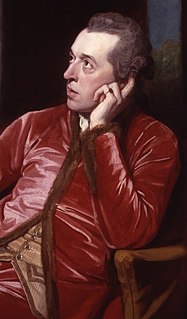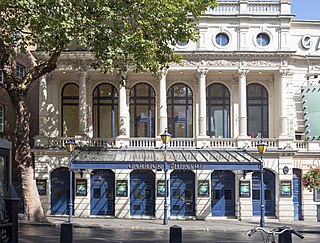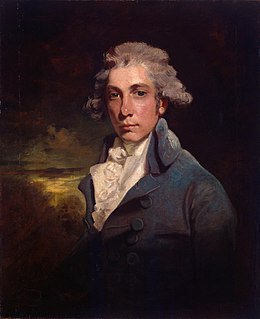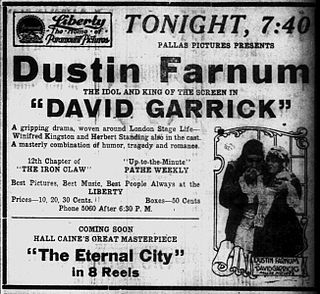
David Garrick was an English actor, playwright, theatre manager and producer who influenced nearly all aspects of European theatrical practice throughout the 18th century, and was a pupil and friend of Dr Samuel Johnson. He appeared in a number of amateur theatricals, and with his appearance in the title role of Shakespeare's Richard III, audiences and managers began to take notice.

Richard Cumberland was an English dramatist and civil servant. In 1771 his hit play The West Indian was first staged. During the American War of Independence he acted as a secret negotiator with Spain in an effort to secure a peace agreement between the two nations. He also edited a short-lived critical journal called The London Review (1809). His plays are often remembered for their sympathetic depiction of characters generally considered to be on the margins of society.

Charles Dibdin was an English composer, musician, dramatist, novelist, singer and actor. With over 600 songs to his name, for many of which he wrote both the lyrics and the music and performed them himself, he was in his time the most prolific English singer-songwriter. He is best known as the composer of "Tom Bowling", one of his many sea songs, which often features at the Last Night of the Proms. He also wrote about 30 dramatic pieces, including the operas The Waterman (1774) and The Quaker (1775), and several novels, memoirs and histories. His works were admired by Haydn and Beethoven.

Thomas John Dibdin was an English dramatist and songwriter.
Hugh Kelly was an Irish dramatist and poet. From the 1760s he was employed as a propagandist for the British government, attacking members of the Opposition. After arriving in London in 1760 to work as a staymaker, he soon turned to become a writer and made a living as a journalist. In 1766 he published Thespis, a long poem about the acting profession, which gained him wide attention. He followed up this success with the novel Memoirs of a Magdalen in 1767. He ultimately became known for his stage plays such as False Delicacy and A Word to the Wise.

The Garrick Theatre is a West End theatre, located in Charing Cross Road, in the City of Westminster, named after the stage actor David Garrick. It opened in 1889 with The Profligate, a play by Arthur Wing Pinero, and another Pinero play, The Notorious Mrs. Ebbsmith, was an early success at the theatre. In its early years, the Garrick appears to have specialised in the performance of melodrama. The theatre later became associated with comedies, including No Sex Please, We're British, which played for four years from 1982 to 1986.

Elizabeth Griffith was an 18th-century Welsh-born dramatist, fiction writer, essayist and actress, who lived and worked in Ireland.
Sol Stein was the author of 13 books and was Publisher and Editor-in-Chief of Stein and Day Publishers for 27 years.
Robert Owenson (1744–1812) was an Irish actor, author and father of Lady Olivia Clark and novelist Sydney, Lady Morgan.
Michael Morton was an English dramatist in the early 20th century.

The Camp: A Musical Entertainment is a 1778 play by Richard Brinsley Sheridan, with assistance from John Burgoyne and David Garrick. The set designs were by Philip James de Loutherbourg. The play gently satirised the preparations of the British to organise home defences during the American War of Independence when an invasion of the British Isles by France, and later Spain, seemed imminent. It focuses on a military camp placed near Coxheath in Southern England. It premiered on 15 October 1778 at the Drury Lane Theatre.

The West Indian is a play by Richard Cumberland first staged at the Drury Lane Theatre in 1771. A comedy, it depicts Belcour, a West Indian plantation-owner, travelling to Britain. Belcour tries to overcome his father's lingering disapproval of him and marry his sweetheart Louisa. Its hero, who probably owes much to the suggestion of Garrick, is a young scapegrace fresh from the tropics, "with rum and sugar enough belonging to him to make all the water in the Thames into punch," — a libertine with generous instincts, which prevail in the end. This early example of the modern drama was favorably received; Boden translated it into German, and Goethe acted in it at the Weimar court.
The Irish Widow is a play by David Garrick first staged at Drury Lane Theatre on 23 October 1772. It was written in less than a week by Garrick and resembled the plot of Le Mariage forcé by Molière. A comedy, it depicts an elderly man who falls in love with his nephew's fiancée, the young Irish Widow Brady, and uses his control over his nephew's inheritance to end the relationship setting off a chain of events. The play was a success and was performed frequently until the 1820s.

The Jealous Wife is a 1761 British play by George Colman the Elder. A comedy, it was first performed at the Drury Lane Theatre on 12 February 1761 and ran for 19 performances in its first season and 70 by the end of the century. It was translated into French and German.
The British Library's Garrick Collection is a collection of early printed editions of English drama amassed by the actor and playwright David Garrick. The collection was bequeathed to the British Museum in 1779.
Bon Ton; or, High Life Above Stairs is a comedy act in two acts by David Garrick, first performed at the Theatre Royal, Drury Lane on 18 March 1775. According to Garrick's introductory notice to the play, it had been written many years before.
Agis, A Tragedy is a blank verse tragedy by the Scottish dramatist John Home. It was his first play, but has been greatly overshadowed, by his second play Douglas.

Miss in Her Teens; or The Medley of Lovers is a farce written in 1747 by David Garrick. It was adapted from Florent Carton Dancourt's 1691 play La Parisienne. It was the third play written by Garrick, and was first performed on 17 January 1747 at Covent Garden.
John Cargill Thompson was a Scottish dramatist specialising in one-person plays. After the performance of his 52nd play, he was described as "Britain's most prolific playwright", surpassing Shakespeare's 37 and Alan Ayckbourn's 51.

David Garrick is a 1916 American silent historical film directed by Frank Lloyd and starring Dustin Farnum, Winifred Kingston and Herbert Standing. The film was based on Thomas William Robertson's 1864 play of the same name, which portrayed the life of the eighteenth century British actor David Garrick. It was one of several film versions of the play made during the silent era.











